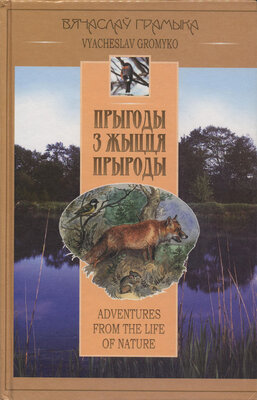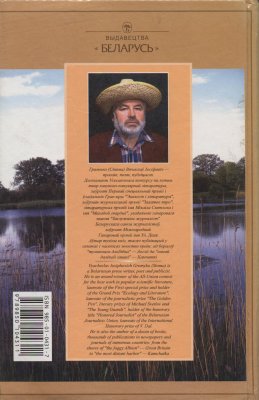Прыгоды з жыцця прыроды
Adventures from the life of nature
Вячаслаў Грамыка
Выдавец: Беларусь
Памер: 263с.
Мінск 2003
Once you walk aside you will see similar numerous gray reddish little caps on long stems dancing in a ring on the edge of an opening in the wood. Their number is so amazing that you may get at a loss not knowing what side to rush to. You can fill one, two or even five baskets at one and the same place.
There are lots of other mushrooms that you can find in our woods! Here you can see a Polish mushroom similar to the white edible boletus, a countless number of brightly colored russules, sweet white field mushrooms, yellow fleshy mossiness mushrooms and quite tiny red “podreshetnicks”. Each mushroom is attractive in its way.
Don't be lazy, be quick but don't make too much haste. An experienced mushroomer puts every mushroom into his basket very carefully and accurately.
In a wicker basket they lie with their stems upwards, without mixing into a common inexpressive heap. Here they are well aired. A foresighted man will never put mushrooms neither into
a bucket, nor into a plastic bag, for they quickly overheat and get spoiled in it. Then all your efforts will be wasted.
Coming back home you must sit down to sort your “catch”. Some will go onto the supper pan at once, others will be cooked as a reserve. Something will be picked out and put by for the next day meal. The bigger white mushrooms “borovicks” will be prepared for drying, the smaller ones will be pickled. The majority of lamellar mushrooms will be salted in an oak cask, but here much depends on the taste of the cook.
Man isn't the only one who gathers and stores up mushrooms. Many wild animals show as much interest for them, too.
Here is a bow-legged badger going out for a “quiet hunting”. But as soon as a mushroom appears on its way the badger quickly knocks it down with its paw and puts it in a visible place — either on some stone or a stump. Then it continues its way. Several days later going along the same path he turns the knocked mushroom caps on the other side.
And when the mushrooms become properly sun-dried, the badger takes them into its hole. In winter waking up from time to time it will be regaling himself. It is just as good a judge of mushrooms as a man. It stores up only “borovicks”, new orange and brown cap mushrooms, ignoring the rest. Its stay in the forest is not limited, it lives there and can store up “borovicks” only.
When a raccoon dog comes across a big white mushroom it starts having dinner without delay. Chewing loudly it swallows with leisure the fat and sweet lumps of its cap.
And there, between two young aspens there flew together a small flock of grey thrushes. They were pecking to bits a big and very old orange cap boletus, but suddenly a magpie flew up to the mushroom, dispersed the thrushes and set to have the meal. It even croaked for pleasure like a crow — so delicious the meal tasted.
The squirrel is the greatest gourmand among forest inhabitants when it comes to the “vegetable meat”, but it doesn't use fresh mushrooms. It is quite another matter when they are newly dried and stored up in its winter larders. And when there are biting frosts in the forest and everything is covered with such
heavy thick snow drifts that it becomes impossible to get anything eatable from under the snow, then it is the best time to use the delicacies.
That is why the squirrel works hard. Having found a mushroom the squirrel nibbles its stem a bit at the bottom and then breaks it with its quick little paw. To prevent mushrooms from spoiling by insects and getting them dried quicker the squirrel hangs them on branches. She threads mushroom caps on thin dry twigs and leaves them there until they get dried. Later she puts dry selected mushrooms into tree hollows and cracks and gets down to work again. Everything will be eaten during the long wintertime.
Overstocking is not at all unnecessary. Anyone may come across its larder by chance and use the free supplies. They are scattered all over the wood unguarded at all and some larder can be lost, one can't remember all hiding places. So it is better to store up more. The more you stock up in summer, the better you live in winter. Especially when there are lots of mushrooms in the wood and the squirrel isn't lazy bones at all!
Mushroom season lasts till late autumn. “Borovicks” and orange cap boletuses are replaced by green cap autumn mushrooms and coral milky caps. Honey agarics are abundant.
Gradually the weather changes. It rains more often and sometimes incessantly. At one moment the sun shines brightly again as it does in summer, at another sharp gusty wind brings heavy clouds across the sky. But till the very early autumn frost when thin ice covers the puddles and begins to crackle under your feet, a mushroomer can enjoy his favorite pastime and a good rest in the forest.
SHORT SKETCHES
Bird Talks
They say birds talk among themselves while singing. As soon as a nightingale starts singing in the pussy-willow depths and it is immediately clear to its tribe fellows that there is no point to stop here — the nesting place is occupied. Say, magpies start chattering loudly and every living creature in the forest is well aware that some danger is approaching — more likely a hunter is sneaking. Or if sparrows start twittering more cheerfully in the yard, then rejoice the bird's breed! Spring is on the way.
Sometimes man's words can be evidently heard in bird songs. A chiflfchaff has hidden in the head of the bush on a hot day and is rejoicing: “Tsen, tsen, tsen, tsen, tsen” (“tsen” — shadow — V.G.). Big tomtits are sort of playing the count game. “Two by two, two by two, two by two!” — one of them twitters. And the other answers it: “Four, four, four!” A rush bird is hovering over the overgrown fishpond and as if teasing the fish: “Crucian, crucian, crucian, tench, tench, tench!”
“Chyzh-zh, chyzh-zh!” a siskin is introducing itself. “Yula, yula, yula, yula ... ” a woodlark is repeating its name in different manners, hovering high in the sky. “Ud-dod...ud-dod... uddod,” a hoopoe is muttering to itself in the depth of the wood. *
Different sounds start reaching our ears in the evening. They, like the darkness itself, are no longer pleasant and tender, but harsh and sometimes even alarming. “Ha-ha-ha!” when an owl
* “chyzh” is a Belarussian name for a siskin, “yula” — for a woodlark and “udod” — for a hoopoe.
starts roaring with laughter in the dense of the forest it makes you feel creepy all over from unexpectedness. And a small swamp bird, somehow resembling a heron, would breathe in as mush air as possible, sing its long beak into the water and roar like a bull. They call it bull because of it.
“Be-e-e-e...” ram's bleating is spreading throughout the field. “Be-e-e-e...” it is greeting the dawn.
Here is not a ram at all, but frisky kicks of a woodcock snipe and it is “singing” not with its voice, but with ... a tail. Its tail has a very peculiar feather, so this bird sings with its tail. Falling from above, it spreads its tail wide. The extreme hard feathers in its tail jingle in the air in a special way, as if ram's bleat is spreading out in the sky. For this reason it was given a non-bird name — “the sky ram”.
In the morning a female quail is hurrying to drive housewives out into the field as soon as possible and you can hear its nonstop crying “Podz polot!.. Podz polot!.. Podz polot!..” — (“Go and weed!..” — K.G.).
Forest paths
Forest paths... They are always pleasant and mysterious and sometimes even enigmatic. The forest does not show the road to its secret treasury to everyone. All depends on a man.
Suppose, one man walks and does not notice anything special around him — trees are as they should be, the same is the grass.
But another one, walking along the same path, will see much more. It is only necessary to have a more attentive look and the forest willingly reveals its “soul”.
Observing what is happening around, a man would notice the squirrel, which lurked on a branch and small holes stamped like whole rings on a young birch, where from a woodpecker savors sweet birch sap. And if he casts a look at an ant hill — he will even determine the weather for the nearest days. He understands, why an old conifer has suddenly groaned loudly, why branches of a tall fir tree have bent and, moreover, he can definitely determine who has uttered such a loud cry somewhere in the very thicket.
A man understands the forest and the forest understands him — it will give sap to him and provide shelter in case of rain,
it will let him have rest in the coolness of trees if he is tired, it will give him firewood in cold times and, if necessary, it will feed him.
The Squirrel Pine Forest
The squirrel pine forest with sparse trees is specially remembered nearly from early childhood. Its beauty attracted you at any time on a bright sunny day and in rainy weather, in grey dusk and a fresh cold morning.
The pine forest was inhabited by an extremely great number of squirrels. Once you appear in it a great alarm began there. But the squirrels didn't betray themselves by making extra noise. A light rustle was heard from the trees and from time to time you could hear the squirrels clicking or a cone would fall down, lost by a squirrel.
If you hide and look attentively you will manage to see the squirrels themselves — now they would jump one after another from branch to branch, now a curious beauty with marvelous small ears looking like little brushes would peep from behind a trunk.
Squirrels' nests hanging somewhere in the branching of mighty old trees were made of little branches, twigs and moss and carefully covered from above, and inside they might have been lined with wool and dry litter. There is no denying they are exceptionally good housekeepers.
Live Barometers
Who wouldn't like to find out about the weather beforehand? Often not out of mere curiosity — man's activities greatly depend on weather changes. The great Russian scientist M. Lomonosov said good words about its forecast: “There would be nothing left for man to ask God for if he could learn how to forecast weather.”
 КНІГІ ОНЛАЙН
КНІГІ ОНЛАЙН


